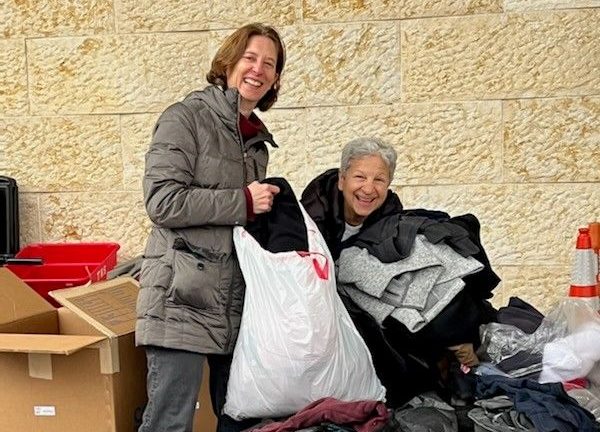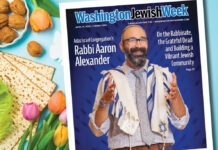
When Temple Rodef Shalom put out an urgent request for warm winter clothes for political refugees arriving from Nicaragua, the response from congregants was swift and overwhelming.
Donations of clothing and shoes poured in the morning of Feb. 12, in response to emails that came as late as 2 a.m. The contributions were much more that what was needed — enough to fill 11 SUVs, said Julie Schechter Torres, who is co-coordinator of the Falls Church temple’s refugee and asylum committee.
More than 200 political prisoners were released Feb. 9 by the authoritarian Nicaraguan government. They were put on an early morning flight, chartered by the U.S. State Department, arrived at Dulles International Airport and were transported to a nearby hotel.
“They only had the clothes that they were wearing, which was completely inadequate for our weather here,” said Torres, who met some of the political asylees. An asylee requests protection and is granted asylum within the United States. “They were taken out of prison very suddenly and didn’t know where they were being taken and were not given any of their possessions.”
More than 100 members of the synagogue participated in the drive.
“It feels good just to show up and do something that counts and that contributes,” said volunteer Shirah Cohen of Arlington, who with a group of 20 members received and sorted the clothing items at the temple.
Torres, who distributed clothing at the hotel, got the opportunity to talk to the asylum seekers in Spanish. She met one refugee who said his only crime “was doing my job.” He related that he had been a driver for journalists from the leading newspaper in Nicaragua. “He told me his arrival here was bittersweet. While he and his family were thrilled he was free, they were sad to be separated, ‘but they would rather see me through a video screen than not see me at all,’” he told Torres.
A Spanish broadcasting station interviewed Moises Leiva, one of the recipients of a coat donated by Rodef Shalom. Torres translated his words: “I came with my arms folded around myself in a shirt and shorts, with this really cold weather, so this [clothing] has come to me like a blessing.”
Torres met one refugee who was a Sephardic Jew. “He showed me a photo of himself with a rabbi who had visited from the U.S. and he enthusiastically recited the Hebrew alphabet and a few Hebrew words that he knows.”
A woman that Torres encountered spoke effusively about the American Jewish World Service, which had supported some of the political prisoners and their families while they were imprisoned. “She said she was so grateful to them, to us, and the whole Jewish community.”
Torres said Jewish values inform the work of volunteers who help resettle refugees and asylees at Rodef Shalom.
“It’s the mitzvah of repairing the world, welcoming the stranger and clothing the naked. It’s something that our congregation is very passionate about.” ■
Ellen Braunstein is a freelance writer.






